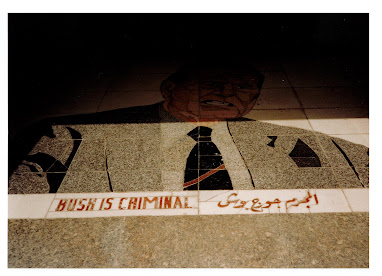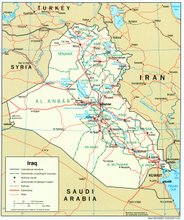22 Years After Bush's Disastrous Iraq War Only Strengthened Iran to Control Yemen and the Region
The 2003 illegal invasion of Iraq, which was essentially sold on a fraud (i.e. non-existent "weapons of mass destruction"), destroyed the nation and people of Iraq, killing more than one million people, displacing millions of others, costing the American taxpayers over $2 trillion dollars, strengthened Iran which with its nuclear program and control of Iraq and the region making it the greatest threat to peace in the region.
It was not a case of "mistaken" intelligence as many apologists would try to sell to defend these con-artist politicians who sold the war; rather it was a fraudulent act of deceiving the American people and the world at large to justify the disastrous killing and maiming of innocent people, destroying nation-states, causing terrorism to spread in a vacuum of power, and empowering nations like Iran to take over much of the Middle East (Iraq, Syria, Lebanon, and Yemen) unhindered and with a nuclear program.
The corrupt politicians and their Iranian-controlled mafia-like militias that Bush put in power in Iraq in 2003 still run the country through rigged elections and armed gangsters, plundering the nation's wealth while the people suffer from lack of basic services like clean water, running electricity, sewage treatment, and functioning roads.
Bush aligned himself with Iran's proxies and installed them in power in Iraq causing the wholescale theft of Iraq's wealth in order to finance Tehran's regional terrorism. Iran's proxies have dismantled Iraq's infrastructure like the national electric grid to force Iraq to buy electricity and fuel from Iran, giving that regime billions of dollars in cash to sponsor terrorism and destruction. Tehran's proxies in Baghdad have flooded Iraq with cheap Iranian products to suck up Iraq's dollars in order to finance Iran's mischief in the region.
The death and destruction in the Middle East this past year is all due to Bush empowering Iran to spread its mayhem and hateful agenda. Hundreds of thousands of Syrians died because Iran supported Assad's murderous sectarian dictatorship with money, arms, and militia fighters. Hundreds of thousands of Yemenis died because Iran supported the Houthi rogue terrorist group to take over the country and financed it with money and arms.
The military actions today in Yemen are due to Bush's incompetency by not realizing that the effect of his destruction of Iraq empowered Iran to take over countries like Yemen by using Iraqi oil dollars to finance it.
Thanks to the Bush Administration, Iran was able to rule the region through its proxies in Iraq, Syria, Lebanon, Yemen, and elsewhere, and uses terrorist groups and its sectarian militia proxies to spread violence and destruction in the region.
In contrast, President Clinton was impeached for an extra-marital affair and President Trump for a phone call to a foreign leader about his political rival.
Yet the man who caused the deaths of over one million innocent people, spent over $2 trillion dollars of taxpayer funds, caused the spread of murder and destruction in the region, and empowered Tehran to pursue a nuclear agenda, all based on a fraud sold to the world, was never impeached or even held accountable by Congress or any attorney general or special prosecutor.
Will Bush and his accomplices ever be held accountable for their misdeeds?

